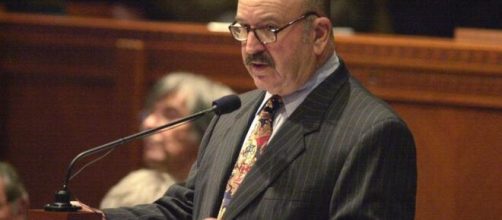Mike Foster was at different times controversial during his political career. He came under fire for his ties to white supremacist David Duke. And he was found to have violated Louisiana's ethics code over a campaign expenditure.
But after he became governor, he gained popularity for his public educations reforms and debt reduction. Foster also became known for his staunch opposition to gambling and political corruption. Foster died on October 4, 2020.
Was a member of a political dynasty
Foster's grandfather, Murphy J. Foster, was an immensely polarizing figure.
He achieved many political successes, becoming a Democratic governor of Louisiana and a U.S. senator. However, he actively promoted white supremacy and suppressed the African-American vote. His 1896 re-election as governor is suspected of having been aided by fraud and violence at the polls. Another of Mike Foster's relatives, Jasper Goodwill, was mayor of Minden in northern Louisiana.
Mike Foster was an Eagle Scout as a boy. He graduated from Louisiana State University and the Southern University Law Center. Foster served in the Korean War, later retiring from the U.S. Air Force as a captain.
After his military career, Foster became a sugarcane farmer and founded a construction company. Eventually, he presided over the sugar manufacturing company Sterling Sugars, Inc.
He was also the president of the Farm Bureau of St. Mary Parish in southern Louisiana.
Was a two-term governor of Louisiana
According to CNN, Foster entered politics because he was 'frustrated with the non-responsiveness of state government.' He launched a primary challenge against Democratic incumbent State Senator Anthony Guarisco Jr. Foster reportedly decided Guarisco wouldn't return his telephone calls.
Foster won the primary and later the general election. He was subsequently re-elected to another term in the Louisiana State Senate.
WKOW notes that Foster's first gubernatorial campaign was considered a long-shot. Partway through his campaign, he switched his party affiliation and became a Republican.
He got a boost from the party flip. And Louisiana's unique electoral system may have helped him out.
On election day, the result was largely split between four candidates. None of whom came anywhere close to reaching a majority of votes cast. Foster and Democratic U.S. Representative Cleo Fields received the two most votes and advanced to a run-off. Foster won in a blowout.
Foster would win re-election in a similar blowout in the first round, avoiding the need for a run-off. State law prohibited him from running for another consecutive term, and he retired from politics. In 2003, he was inducted into the Louisiana Political Museum and Hall of Fame. His grandfather, even despite the symbolic baggage that goes with him, was inducted in 1997.


